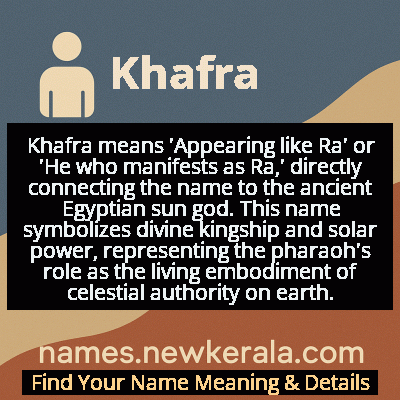Khafra Name Meaning & Details
Origin, Popularity, Numerology Analysis & Name Meaning of Khafra
Discover the origin, meaning, and cultural significance of the name KHAFRA. Delve into its historical roots and explore the lasting impact it has had on communities and traditions.
Name
Khafra
Gender
Male
Origin
Egyptian
Lucky Number
9
Meaning of the Name - Khafra
Khafra means 'Appearing like Ra' or 'He who manifests as Ra,' directly connecting the name to the ancient Egyptian sun god. This name symbolizes divine kingship and solar power, representing the pharaoh's role as the living embodiment of celestial authority on earth.
Khafra - Complete Numerology Analysis
Your Numerology Number
Based on Pythagorean Numerology System
Ruling Planet
Mars
Positive Nature
Generous, passionate, energetic, and humanitarian.
Negative Traits
Impulsive, impatient, moody, and can be overly emotional.
Lucky Colours
Red, maroon, scarlet.
Lucky Days
Tuesday.
Lucky Stones
Red coral, garnet.
Harmony Numbers
1, 2, 3, 6.
Best Suited Professions
Military, sports, philanthropy, leadership roles.
What People Like About You
Courage, energy, leadership, generosity.
Famous People Named Khafra
Khafra
Pharaoh of Ancient Egypt
Built the second Giza pyramid and likely the Great Sphinx
Khafra-ankh
High Priest and Royal Official
Oversaw royal construction projects and religious ceremonies
Prince Khafra
Royal Prince
Member of the Fourth Dynasty royal family, depicted in temple reliefs
Name Variations & International Equivalents
Click on blue names to explore their detailed meanings. Gray names with will be available soon.
Cultural & Historical Significance
The cultural impact of Khafra extends far beyond his lifetime, influencing Egyptian art, architecture, and religious practice for centuries. The precision and scale of his pyramid complex set new standards for royal tomb construction, while the Sphinx became an enduring symbol of Egyptian civilization itself. In modern times, Khafra's name evokes the mystery and grandeur of ancient Egypt, representing human achievement at its most ambitious. The name continues to inspire archaeological research and public fascination, serving as a bridge between contemporary society and one of humanity's earliest great civilizations.
Extended Personality Analysis
The name Khafra suggests a personality characterized by monumental ambition, strategic vision, and a deep sense of historical legacy. Individuals with this name often exhibit natural leadership qualities combined with practical wisdom, reflecting the pharaoh's dual role as both spiritual guide and administrative ruler. They tend to be patient yet determined planners who understand that great achievements require long-term commitment and meticulous execution. There's often a philosophical depth to their character, contemplating their place in larger historical or cosmic patterns.
Khafra-named individuals typically demonstrate strong organizational skills and the ability to manage complex projects, much like the ancient pharaoh overseeing the construction of massive architectural works. They value tradition and stability but are also innovative in their problem-solving approaches. Their leadership style often balances authority with responsibility, showing both the confidence to command and the wisdom to listen to advisors. The name carries connotations of endurance and permanence, suggesting someone who builds foundations meant to last and who considers the long-term consequences of their actions.
Modern Usage & Popularity
In contemporary naming practices, Khafra remains exceptionally rare and is primarily used within specific cultural contexts. It appears occasionally among families of Egyptian heritage seeking to honor their ancient roots, or among African diaspora communities reconnecting with pre-colonial history. The name has minimal presence in global birth statistics, maintaining its status as a distinctive and historically profound choice. Modern usage is largely confined to academic circles, historical enthusiasts, or creative works set in ancient Egypt. Parents selecting this name typically value its powerful historical associations, unique phonetic qualities, and the sense of cultural continuity it represents. While its complexity and strong cultural specificity prevent widespread adoption, it serves as a meaningful choice for those seeking a name with deep historical resonance and architectural grandeur.
Symbolic & Spiritual Meanings
Symbolically, Khafra represents humanity's eternal quest for immortality through monumental achievement and lasting legacy. The name embodies the intersection of divine aspiration and earthly accomplishment, where mortal rulers sought to bridge the gap between human and celestial realms. As a solar name meaning 'Appearing like Ra,' it carries connotations of illumination, life-giving energy, and cyclical renewal—symbolizing both the daily rebirth of the sun and the eternal nature of true legacy. The pyramid association makes it emblematic of ascent, both physical construction reaching toward the heavens and spiritual journey toward enlightenment. The Sphinx connection adds layers of esoteric wisdom, guardianship of ancient knowledge, and the mystery of unsolved riddles. Together, these symbols create a rich tapestry of meaning around permanence, wisdom, authority, and the human capacity to create works that transcend generations.

